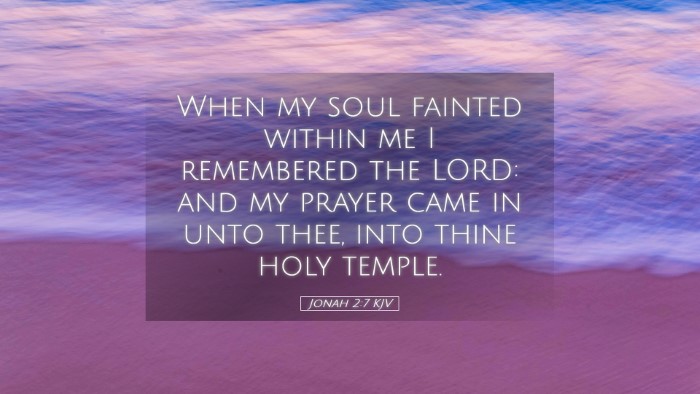Old Testament
Genesis Exodus Leviticus Numbers Deuteronomy Joshua Judges Ruth 1 Samuel 2 Samuel 1 Kings 2 Kings 1 Chronicles 2 Chronicles Ezra Nehemiah Esther Job Psalms Proverbs Ecclesiastes Song of Solomon Isaiah Jeremiah Lamentations Ezekiel Daniel Hosea Joel Amos Obadiah Jonah Micah Nahum Habakkuk Zephaniah Haggai Zechariah MalachiJonah 2:7
Jonah 2:7 KJV
When my soul fainted within me I remembered the LORD: and my prayer came in unto thee, into thine holy temple.
Jonah 2:7 Bible Commentary
Bible Commentary on Jonah 2:7
Verse Context: Jonah 2:7 reads: "When my soul fainted within me, I remembered the Lord: and my prayer came in unto thee, into thine holy temple."
Overview
This verse occurs during the depths of Jonah's distress while in the belly of the fish, signifying a turning point where he begins to seek the Lord earnestly. This prayerful reflection of Jonah encapsulates a profound moment of recognition and desperation, showcasing themes of repentance, hope, and divine mercy which resonate throughout the biblical narrative.
Insights from Commentaries
Matthew Henry's Commentary
Matthew Henry emphasizes the gravity of Jonah's situation, noting that the physical darkness he experienced mirrored his spiritual state. He asserts that in times of utter despair, even in the most dire circumstances, the remembrance of the Lord becomes a source of hope. Henry points out that Jonah’s recognition of his desperation leads him to the temple of God, which symbolizes a place of prayer and divine presence.
- Repentance: Jonah's acknowledgment of his situation evokes a spirit of humility—essential for sincere repentance. His cry from the depths signifies a turning back to God.
- Divine Mercy: Henry notes that despite Jonah's earlier disobedience, God remains merciful and opens the path for Jonah's return through prayer.
- Power of Prayer: The prayer offered in distress signifies the powerful connection between the believer's heart and the heavens, emphasizing that true communication with God can occur even from the depths.
Albert Barnes' Notes
Albert Barnes provides a detailed analysis of the emotional and spiritual dimensions in Jonah's prayer. He emphasizes the state of Jonah's soul, marked by a profound sense of loss and the faintness of spirit. According to Barnes, this faintness symbolizes the overwhelming nature of despair which often leads individuals to the realization of their dependence on God.
- Fainting Soul: Barnes interprets the faintness as both a physical and spiritual condition. It provokes a reflective moment, highlighting the necessity of acknowledging God in times of struggle.
- Remembrance of the Lord: The act of remembering the Lord is framed as a pivotal response to crisis, affirming that even in our darkest hours, God waits to hear our cries.
- Prayer in Desperation: His commentary expounds on how Jonah’s prayer ascends to God's holy temple, illustrating the belief that prayers are always heard, regardless of the circumstance.
Adam Clarke's Commentary
Adam Clarke offers a nuanced interpretation, delving into the Hebrew nuances and linguistic constructs within the verse. He stresses how Jonah, while being engulfed by despair, turned his thoughts towards God, which implies an active role in seeking divine help.
- Psychological Insight: Clarke highlights the psychological aspect of Jonah's prayer—implying a transitional moment in Jonah's mental state, where self-awareness catalyzes a desire for divine intervention.
- Significance of "Holy Temple": The mention of God's holy temple underscores a theological principle: God's holiness and the notion of sanctuary amidst turmoil, serving to remind believers that access to God is ongoing, especially in times of need.
- Transformation Through Prayer: Clarke reflects that this moment initiates a transformation. Prayer, initiated from a place of despair, can lead to solace and restoration, reinforcing the biblical principle of God’s willing reception of repentant hearts.
Theological Themes
The encounter reflected in Jonah 2:7 brings forth several theological themes relevant for pastors, students, and theologians.
- Repentance and Restoration: This passage illustrates the essential nature of repentance—an acknowledgment of one's failing and a turn towards God for restoration.
- The Sovereignty of God: Despite Jonah’s flight from God’s command, God's sovereignty facilitates Jonah's return, demonstrating His relentless pursuit of His prophets.
- The Nature of Prayer: This verse affirms the belief in the power of prayer, particularly in moments of intense personal struggle. It serves as a reminder that prayers uttered from sincere hearts are welcomed at any time, regardless of our physical location or state.
Practical Applications
For pastors, students, and scholars, Jonah 2:7 can serve multiple practical applications in both personal and ministerial contexts.
- Encouragement in Trials: This verse can be an encouragement for individuals undergoing trials, serving as a reminder that turning to God in prayer is a pathway out of darkness.
- Teaching on Repentance: Pastoral teachings can draw from this passage to illustrate the importance of repentance in the life of believers, affirming that God hears our cries no matter our state.
- Prayer Emphasis: It emphasizes an active prayer life as foundational for spiritual growth and resilience, urging congregations to cultivate habits of prayer especially in troubling times.
Conclusion
Jonah 2:7 captures a pivotal spiritual moment filled with profound truths about repentance, prayer, and God’s mercy. By synthesizing insights from esteemed commentaries, we can deeply appreciate and apply these lessons to our faith journey. This verse not only reflects Jonah’s personal crisis but offers timeless principles about the nature of God and His relationship with those who call upon Him.


